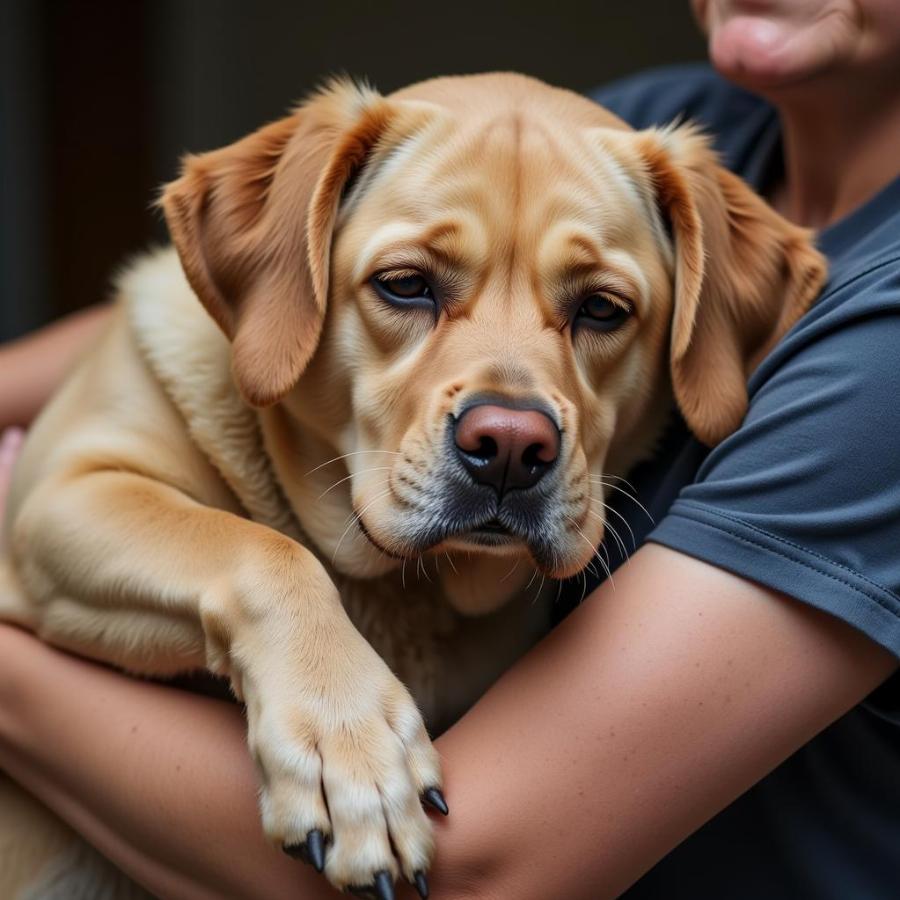As a loving dog owner, witnessing your furry friend approach their final days is heartbreaking. You cherish every moment, seeking solace in their presence. Amidst the emotional turmoil, you might notice your senior dog exhibiting unusual sleep patterns, perhaps twitching, whimpering, or seemingly lost in their dreams. This can be a confusing and concerning time, leaving you wondering, “What is my dying dog dreaming about?”
While we can’t definitively know what goes on in a dog’s mind, especially during their final moments, we can explore some scientific and anecdotal insights into the world of canine dreams.
Decoding Dog Dreams: A Look at the Science
Similar to humans, dogs experience REM (Rapid Eye Movement) sleep, the stage where vivid dreams occur. During this phase, their brain activity mirrors that of their waking hours, suggesting they’re replaying memories, emotions, and experiences.
Common Themes in Dying Dog Dreams
While every dog’s dream world is unique, certain themes might be common, particularly as they near the end of their lives:
-
Reliving Happy Memories: Your dog might be dreaming of joyous moments from their past – chasing squirrels in the park, cuddling with their favorite human, or the sheer bliss of a tasty treat. These dreams could be a source of comfort and peace.
-
Connecting with Loved Ones: Dogs are deeply social creatures, forming strong bonds with their human and animal companions. Dreams could be a way for them to reconnect with those they love, both present and departed.
-
Finding Peace and Resolution: The dying process can be emotionally and physically taxing. Dreams could be a way for your dog to process these experiences, find a sense of closure, and transition peacefully.
Recognizing Signs of Dog Dreams
Besides the telltale signs of whimpering and twitching, other indicators of dog dreams include:
- Rapid eye movements: You might observe their eyes darting back and forth beneath closed eyelids.
- Changes in breathing: Their breathing might become shallow and irregular.
- Vocalizations: Whining, barking, or even growling softly can be part of their dream experience.
How to Comfort a Dreaming Dog
While it’s natural to want to wake your dog from what seems like a bad dream, it’s generally best to let them sleep. Disrupting their sleep cycle could cause them more stress and confusion. Instead, you can offer comfort by:
- Creating a Calm Environment: Ensure their sleeping area is quiet, cozy, and free from distractions.
- Staying Close: Your presence alone can be reassuring. Gently stroke their fur or speak in soothing tones if they seem distressed.
- Focusing on Quality Time: During their waking hours, shower them with love, attention, and their favorite activities.
When to Consult a Veterinarian
While most dog dreams are normal and harmless, excessive vocalizations or restless sleep could indicate underlying health issues, especially in senior dogs. If you notice any sudden or concerning changes in their sleep patterns, consult your veterinarian for proper diagnosis and treatment.
Cherishing the Final Chapter
 Senior Dog and Owner Cuddling
Senior Dog and Owner Cuddling
Witnessing your beloved dog’s final days is never easy. While we can’t fully comprehend their dream world, understanding the science behind it and recognizing common themes can offer a sense of peace. Focus on cherishing every moment, providing comfort and love, and making their final chapter as peaceful and dignified as possible.
Frequently Asked Questions
Q: Do dogs dream in color?
A: While there’s no definitive answer, studies suggest that dogs, like most mammals, dream in black and white due to the structure of their eyes.
Q: Can dogs sense their impending death?
A: There’s no scientific evidence to prove this. However, dogs are highly intuitive creatures and might exhibit behavioral changes as their bodies start to shut down.
Q: Should I be worried if my dying dog is having nightmares?
A: Occasional nightmares are normal. However, if your dog seems excessively distressed or their sleep is consistently disrupted, consult your veterinarian.
Q: What happens to dogs after they die?
A: This is a personal belief and varies across cultures and religions. What matters most is the love and bond you shared with your furry companion.
Need More Information?
For more insights on caring for senior dogs and navigating end-of-life care, explore other helpful articles on Beaut Dogs.
Beaut Dogs is your go-to resource for everything related to dog care. We’re committed to providing you with accurate, compassionate, and expert advice to help you give your canine companion the best life possible.
For personalized support and guidance, reach out to us at [email protected]. We’re here to help!